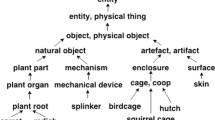Abstract
This work describes a system for supporting the user in the discovery of semantic web services, taking into account personal requirements and preference. Goal is to model an ad-hoc service request by selecting conceptual terms rather than using strict syntax formats. Through a concept-based navigation mechanism indeed, the user discovers conceptual terminology associated to the web resources and uses it to generate an appropriate service request which syntactical matches the names of input/output specifications. The approach exploits the fuzzy formal concept analysis for modeling concepts and relative relationships elicited from web resources. After the request formulation and submission, the system returns the list of semantic web services that match the user query.





Similar content being viewed by others
Explore related subjects
Discover the latest articles, news and stories from top researchers in related subjects.References
Bezdek JC (1981) Pattern recognition and fuzzy objective function algorithms. Plenum Press, New York
Constantinescu I, Binder W, Faltings B (2003) Efficient matchmaking and directory services. In the 2003 IEEE/WIC international Conference on Web Intelligent
DAML+OIL Reference Description (2001) W3C-Note. http://www.w3.org/TR/2001/NOTE-daml+oil-reference-20011218
Fenza G, Loia V, Senatore S (2008) A hybrid approach to semantic web services matchmaking. Int J Approx Reason 48(3):808–828
Fujii K, Suda T (2004) Dynamic service composition using semantic information. In: Proceedings of the 2nd international Conference on Service Oriented Computing. ACM, New York, pp 39–48
Ganter B, Wille R (1999) Formal concept analysis: mathematical foundations. Springer, Berlin
Khalid M, Sycara K, Klusch M, Fries B (2005) OWLS-MX: hybrid semantic web service retrieval. In: Proceedings of the 1st International AAAI Fall Symposium on Agents and the Semantic Web, Arlington VA, USA
Lausen H, Roman D, Keller U (2005) Web Service Modeling Ontology WSMO-Standard. Available: http://www.w3.org/Submission/WSMO/
Li L, Horrocks I (2003) A software framework for matchmaking based on semantic web technology. In: Proceeding of the 12th International Conference on the World Wide Web
Lo C, Tan T, Chao K, Younas M (2005) Fuzzy Matchmaking for Web Services. In: 19th International Conference on Advanced Information Networking and Applications, vol 2, Taiwan, pp 721–726
Miyamoto S (2003) Information clustering based on fuzzy multisets. Inf Process Manage 39:197–213
OWL Services Coalition (2004) OWL-S: semantic markup for web services. http://www.daml.org/services/owl-s/
Paolucci M, Kawamura T, Payne TR, Sycara K (2002) Semantic matching of web services capabilities. In: The 6th IEEE International Symposium on Wearable Computers, Seattle, Washington, USA, pp 7–10
Quan TT, Hui SC, Cao TH (2004) A fuzzy FCA-based approach to conceptual clustering for automatic generation of concept hierarchy on uncertainty data. In: Proceedings of the 2004 concept lattices and their applications Workshop, pp 1–12
Rahman M, Farooq Ahmad H, Suguri H, Sadik S, Longe HOD, Ojo AK (2008) Supply chain optimization towards personalizing web services. In: 4th IEEE International Conference on Intelligent Systems, Varna, Bulgaria September 2008
Rey C, Toumani F, Benatallah B, Hacid M (2003) Request rewriting-based web service discovery. Lect Notes Com Sci 2870:242–257
Sheth A, Patil A, Oundhakar S, Verma K, Sivashanmugam K, Miller J (2005) Meteor-S WSDI: a scalable infrastructure of registries for semantic publication and discovery of web services. J Inf Tech Manage 6(1):17–39
Stumme G, Taouil R, Bastide Y, Pasquier N, Lakhal L (2001) Intelligent structuring and reducing of association rules with formal concept analysis. In: Proceedings of KI 2001: advances in AI, pp 335–350
Sycara K, Paolucci M, Ankolekar A, Srinivasan N (2003) Automated discovery, interaction, and composition of semantic web services. J Web semant 1(1):27–46
Wang Y, Stroulia E (2003) Flexible interface matching for web-service discovery. In: Proceedings of the Fourth International Conference on Web Information Systems Engineering. IEEE Computer Society, Washington, DC, p 147
Wang DX, Hu XG, Liu XP, Wang H (2005) Association rules mining on concept lattice using domain knowledge. In: Proceedings of 2005 International Conference on Machine Learning and Cybernetics, vol 4, pp 2151–2154
Zhou B, Hui SC, Chang K (2005) A formal concept analysis approach for web usage mining. In: Shi Z, He Q (eds) Intelligent information Processing II, Springer, London, pp 437–441
Author information
Authors and Affiliations
Corresponding author
Rights and permissions
About this article
Cite this article
Fenza, G., Senatore, S. Friendly web services selection exploiting fuzzy formal concept analysis. Soft Comput 14, 811–819 (2010). https://doi.org/10.1007/s00500-009-0469-2
Published:
Issue Date:
DOI: https://doi.org/10.1007/s00500-009-0469-2




